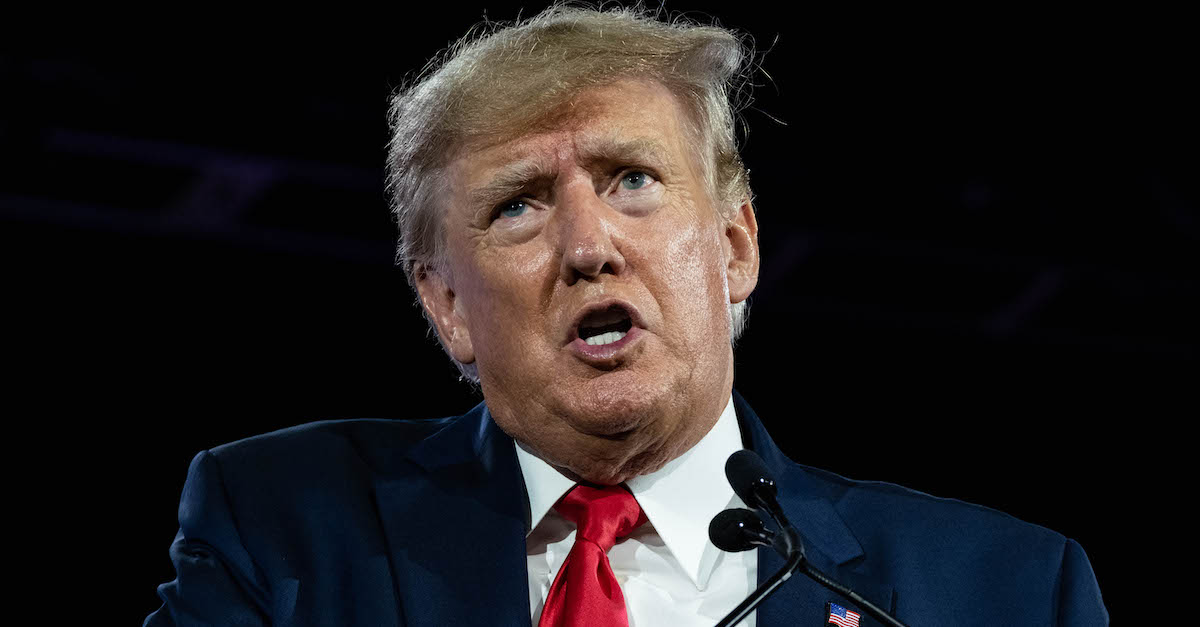
Former U.S. President Donald Trump
The U.S. Department of Justice on Monday asked a federal judge to keep the affidavit supporting the search warrant for former president Donald Trump’s home in Florida under lock-and-key, saying the release of such information could have a negative impact on the ongoing criminal inquiry as well as others similarly situated.
The 13-page response to motions to unseal filed by U.S. Attorney Juan Antonio Gonzalez argues that disclosing the probable cause behind the Aug. 8, 2022 raid on Mar-a-Lago at this point would “cause significant and irreparable damage” to the government efforts.
Key to those efforts, the government claims, is witness testimony. And such a release, according to the filing, would bring a halt to further voluntary engagement with federal law enforcement.
“Disclosure of the government’s affidavit at this stage would also likely chill future cooperation by witnesses whose assistance may be sought as this investigation progresses, as well as in other high-profile investigations,” the response says.
Noting that the underlying case here is a matter “of significant public concern,” the document goes on to argue that sufficient public transparency interests have been availed so far by the government’s own willingness to unseal “the search warrant, its attachments describing the premises to be searched and the property to be seized, and the Property Receipt provided to the former President’s counsel upon execution of the search.”
But, the government says, that’s as far as things should go at this point.
“If disclosed, the affidavit would serve as a roadmap to the government’s ongoing investigation, providing specific details about its direction and likely course, in a manner that is highly likely to compromise future investigative steps,” the filing goes on. “In addition, information about witnesses is particularly sensitive given the high-profile nature of this matter and the risk that the revelation of witness identities would impact their willingness to cooperate with the investigation.”
A footnote elaborates on the argument – and casts the secrecy request as a matter of witnesses’ potential safety:
This is not merely a hypothetical concern, given the widely reported threats made against law enforcement personnel in the wake of the August 8 search.
“The fact that this investigation implicates highly classified materials further underscores the need to protect the integrity of the investigation and exacerbates the potential for harm if information is disclosed to the public prematurely or improperly,” the response continues.
The government also argues that unsealing the probable cause document with enough redactions would render its release moot due to the sourcing involved in the legal background for the search and seizure of documents from the 45th president’s Palm Beach compound.
“[T]he affidavit cannot responsibly be unsealed in a redacted form absent redactions that would be so extensive as to render the document devoid of content that would meaningfully enhance the public’s understanding of these events beyond the information already now in the public record,” Gonzalez writes. “There is simply no alternative to sealing that could ensure the integrity of the government’s investigation and that would prevent the inevitable efforts to read between the lines and discern the identities of certain individuals, dates, or other critical, case-specific information.”
A review of the federal docket shows that the government’s response was specifically filed in response to a request filed by New Hampshire GOP U.S. Senate candidate Andy Martin. The judge overseeing the case, U.S. Magistrate Judge Bruce E. Reinhart, is the same judge who signed off on the search warrant. In a paperless order, he denied Martin’s formal request to intervene, along with several others, ruling that “interests asserted by the movants are adequately represented by the media-intervenors.”
The former president himself commented on the first-of-its-kind search-and-seizure on Monday.
“Wow!” Trump said in a social media post. “In the raid by the FBI of Mar-a-Lago, they stole my three Passports (one expired), along with everything else. This is an assault on a political opponent at a level never seen before in our Country. Third World!”
The DOJ’s full response is available below:
[image via Seth Herald/Getty Images]